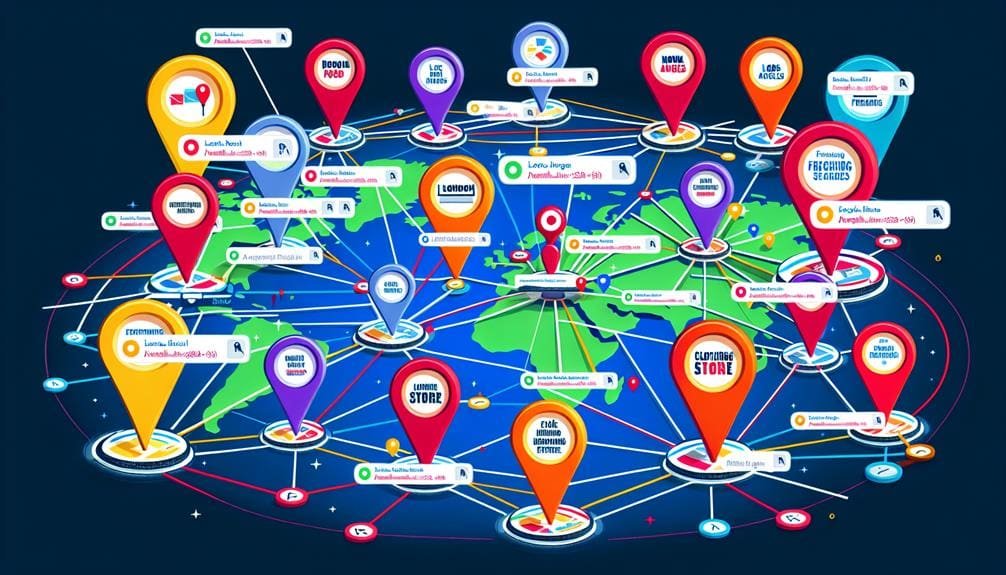Local SEO: Keyword Research Tips for Franchises
January 24, 2024 | by Jacob Cavazos

When it comes to local SEO for franchises, understanding the nuances of keyword research can make a significant impact on visibility and customer engagement. Most people are aware of the importance of keywords, but what they might not know is how to effectively tailor keyword strategies to multi-location businesses. The complexity lies in aligning search terms with specific franchise locations while maintaining overall brand consistency. As we delve into the intricacies of local keyword research for franchises, we'll explore the nuances between implicit and explicit keywords, effective research methodologies, and the crucial aspect of mapping keywords to individual locations. Join us as we uncover the key strategies that can elevate a franchise's local SEO game.
The Importance of Local Keyword Research
Local keyword research is essential for franchises to understand the search behavior of their target consumers and effectively optimize their SEO strategies for improved local visibility. By delving into local SEO keyword research, franchises can gain valuable insights into the specific search terms used by local customers, thereby tailoring their content to match those queries. This approach increases the likelihood of appearing in local search results and the coveted 'local pack', which prominently displays businesses in Google's search results. Utilizing popular local keyword research tools such as Ahrefs, SEMrush, Serpstat, Kparser, and Moz can streamline the research process and improve SEO strategies for franchises aiming to capture the attention of local customers.
Moreover, local keyword research not only helps in improving search engine optimization but also in understanding the local consumer base. It provides the opportunity to uncover related markets to expand into or to refocus products and services. This understanding is crucial for franchise SEO as it ensures that the SEO efforts are in line with the actual search behavior of the local customers, leading to better organic visibility and enhanced engagement with the target audience.
Understanding Implicit Vs. Explicit Keywords

Understanding the distinction between implicit and explicit keywords is crucial for crafting effective SEO strategies that resonate with the search behavior of local consumers. When it comes to local SEO and keyword research, it's essential to differentiate between implicit and explicit keywords to effectively target your audience. Here's what you need to know:
- Implicit Keywords:
- Guesses user intent and offers location-based results.
- Determined through online research and customer feedback.
- Analyze the list of keywords and determine the best fit for your business.
- Explicit Keywords:
- Includes specific location in the search term.
- Research and understand the search behavior of your target audience.
- Utilize keyword research tools to identify specific target keywords.
Conducting Effective Local Keyword Research

Conducting effective local keyword research requires leveraging advanced tools and analyzing data to pinpoint high-impact search queries for targeted local SEO strategies. Utilizing tools such as Semrush's Keyword Magic Tool provides valuable insights into local keywords. Prioritizing keywords based on local metrics and targeting low-hanging-fruit keywords can significantly improve local SEO efforts. Additionally, analyzing competitors' rankings helps identify additional keywords to enhance the local keyword strategy. Filtering and saving relevant keywords using tools like Semrush's Keyword Manager or a spreadsheet is essential, while excluding competitors' brand names. Optimizing Google Business Profile for local keywords and setting up tracking in Semrush to monitor rankings can further improve local visibility.
| Local SEO Tools | Benefits |
|---|---|
| Semrush's Keyword Magic Tool | Provides insights into local keywords |
| Semrush's Keyword Manager | Helps filter and save relevant keywords |
Mapping Keywords to Franchise Locations

To enhance local visibility and drive targeted website traffic, it's essential to associate specific keywords with each franchise location, tailoring keyword strategies to align with localized search intent and capture nearby consumer interest. When mapping keywords to franchise locations, it's crucial to consider the following:
- Utilize keyword research tools: Leverage keyword research tools to identify relevant keywords and target search queries specific to each franchise location. This approach ensures that the chosen keywords resonate with the local audience and improve the franchise's online visibility.
- Implement location-specific keywords: Incorporate location-specific keywords into the franchise website content. By doing so, the website can align with local search intent, increasing the likelihood of capturing the interest of potential customers in the vicinity.
- Enhance local SEO strategy: By aligning keywords with franchise locations, businesses can improve their local SEO strategy, making their online presence more appealing to nearby customers and increasing the likelihood of attracting foot traffic.
Tracking Local Keyword Rankings
When mapping keywords to franchise locations and aiming to enhance local visibility, tracking local keyword rankings becomes crucial for evaluating the effectiveness of our localized SEO efforts. By regularly tracking and analyzing local keyword rankings specific to our location, we can identify trends and opportunities for optimization. Utilizing tracking tools like Semrush allows us to monitor rankings and assess the performance of our local SEO strategy. Additionally, setting up tracking in Semrush enables us to monitor Google Local Finder rankings, providing valuable insights into our online presence in the local area.
| Tracking Tools | Benefits |
|---|---|
| Semrush | Monitor local keyword rankings over time |
| Listing Management tool | Track Google Local Finder rankings |
Frequently Asked Questions
How to Do SEO for Franchises?
We optimize franchise SEO by targeting local franchises, enhancing franchise marketing, and maximizing franchise local presence. Our data-driven approach prioritizes franchise keyword strategy to boost online visibility, ensuring local franchise growth and staying ahead in local franchise competition.
How to Do Keyword Research for Local Seo?
To do keyword research for local SEO, we analyze user intent, competition, and location targeting. We focus on long tail keywords for local search, optimize Google My Business with local keywords, and use mobile and voice search for local optimization.
What Is the Best Strategy for Local Seo?
In local SEO, we prioritize geo-specific keywords for location-based optimization. By targeting low-hanging-fruit keywords, analyzing competitors' rankings, and optimizing Google Business Profile, we enhance regional SEO and employ effective local search tactics for better visibility.
How Do You Rank Local Keywords?
We rank local keywords by considering ranking factors, local competition, geographic targeting, user intent, long tail keywords, content optimization, Google My Business, local citations, mobile optimization, and voice search optimization. It's a comprehensive approach.
RELATED POSTS
View all



